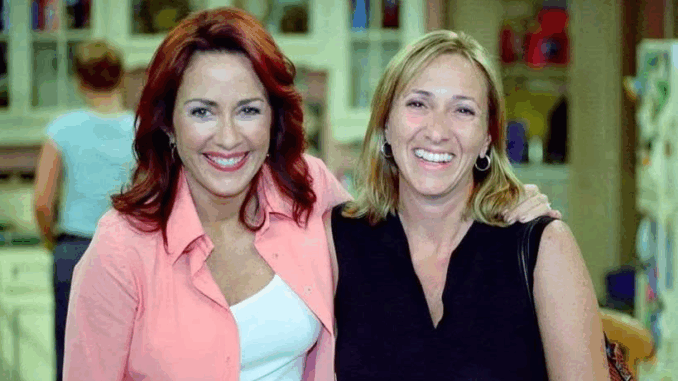
A Sobriety Journey That’s Turning Heads
When Emmy-winning actress Patricia Heaton announced she had given up alcohol at age 60, it made headlines. Why? Because in a culture that often glamorizes wine nights and “mommy juice,” her choice felt refreshingly bold and deeply personal.
But here’s what really grabbed hearts: she didn’t just quit for herself—she did it for her future grandchildren.
Let’s dive into the why, how, and what we can all learn from Heaton’s inspiring journey.
Who Is Patricia Heaton? A Quick Recap
If you’ve ever watched Everybody Loves Raymond or The Middle, you know Patricia Heaton. She’s that sharp-witted mom who could handle chaos with one eyebrow raised.
With decades in Hollywood, four grown sons, and a thriving second act, Heaton is more than just a sitcom star—she’s a symbol of real-life resilience.
Why She Decided to Quit Drinking at 60
At 60, most people are thinking about retirement. Heaton was thinking about her legacy.
“I want to be around, healthy and clear-minded, for my future grandchildren,” she shared in a candid video on social media.
The decision wasn’t spurred by rock bottom or scandal. It was proactive, not reactive—and that’s what makes it powerful.
Breaking the Wine Mom Stereotype
Let’s be honest: drinking is deeply embedded in our culture, especially for women. There’s a whole market around wine glasses labeled “Mom Fuel.”
Heaton’s decision quietly but confidently challenged that narrative. She showed that it’s okay—maybe even awesome—to choose clarity over cocktails.
Her Public Sobriety Announcement Went Viral
When Heaton shared her milestone—one year sober—on Instagram, fans were quick to applaud her honesty. She didn’t glam it up. No staged photo shoot. Just real talk about why she gave it up and how she feels now.
Spoiler alert: she feels better than ever.
How Sobriety Changed Her Daily Life
Since quitting alcohol, Heaton says she’s experienced:
-
Improved energy levels
-
Sharper mental focus
-
Better sleep
-
Increased emotional balance
In other words, sobriety didn’t take anything away from her—it gave her back more.

Sobriety and Aging Gracefully
Let’s talk straight: aging is inevitable, but how we do it? That’s up to us.
Heaton’s choice reflects a growing awareness among Gen X and Baby Boomers that longevity isn’t just about living longer—it’s about living well.
Cutting out alcohol, for many, is a way to improve health markers like blood pressure, brain clarity, and liver function. Heaton just happens to be one of the few celebrities openly talking about it.
Drinking Wasn’t a Problem—But It Wasn’t Helping
What makes Heaton’s story relatable is that she didn’t quit because she hit a crisis. She quit because alcohol was no longer serving her purpose.
“I wasn’t falling down drunk, but I noticed the impact it had on my sleep and energy,” she explained.
This kind of intuitive self-awareness is what many people ignore until it’s too late.
The Grandchildren Factor: Thinking Ahead
Heaton’s sons are grown, and grandkids aren’t even in the picture yet—but that didn’t matter. She wants to be the vibrant, present grandmother who gets down on the floor for puzzles, joins family hikes, and keeps up with toddlers.
That future version of herself is what motivates her today. Honestly? That’s the kind of forward-thinking we could all use more of.
From Wine Time to Mind Time
Without the nightly glass of wine, Heaton says she has more space to reflect, read, write, and simply be.
Sobriety isn’t a subtraction—it’s an invitation to be more connected. More engaged. More in tune with your real self.
Sobriety Isn’t Just a Trend—It’s a Movement
Heaton’s story aligns with the growing “sober curious” movement, where people explore life without alcohol—not necessarily due to addiction, but to improve overall wellness.
This approach is gaining traction among all ages, especially those who want to feel clear-headed, intentional, and joyful.
What Fans Are Saying
Reactions to Heaton’s journey have been overwhelmingly positive. Fans flooded her comments with messages like:
-
“You’ve inspired me to try a dry month.”
-
“Thank you for showing that it’s never too late to make a change.”
-
“I want to be that kind of grandparent too.”
How She’s Helping Others Through Her Story
Heaton isn’t preaching. She’s not pushing. She’s just living her truth out loud, and in doing so, she’s helping others rethink their own habits.
And that’s the beauty of it—you don’t have to be a celebrity to influence others. You just have to be honest.
A Legacy That Goes Beyond TV
Patricia Heaton will always be known for her roles on television, but this chapter—her sober, present, grounded self—might just be her most meaningful role yet.
She’s showing us that strength doesn’t always look like hustle. Sometimes, it looks like choosing presence over escape.
Conclusion: Sobriety Is the Gift She’s Giving Her Future Family
At 60, Patricia Heaton didn’t just make a health choice—she made a love choice. She chose to be fully present for what’s to come, especially for the little ones she hasn’t even met yet.
Her decision to quit drinking wasn’t about loss—it was about gaining more. More clarity. More energy. More life.
So whether you’re 25, 40, or 60, Heaton’s message rings true: it’s never too late to choose better for yourself and the people you love.
FAQs
1. Why did Patricia Heaton quit drinking at age 60?
She chose sobriety to feel healthier, stay sharp, and be fully present for her future grandchildren.
2. Was she struggling with alcoholism?
No—Heaton said she wasn’t battling addiction. She simply realized alcohol was impacting her energy, sleep, and focus.
3. How did fans react to her sobriety journey?
Most fans were incredibly supportive. Many said she inspired them to rethink their relationship with alcohol.
4. What benefits has she noticed since quitting alcohol?
Heaton reports better sleep, mental clarity, emotional balance, and overall well-being.
5. Is she part of a larger movement?
Yes—her story aligns with the “sober curious” movement, where people choose sobriety as a lifestyle for wellness, not just recovery.
